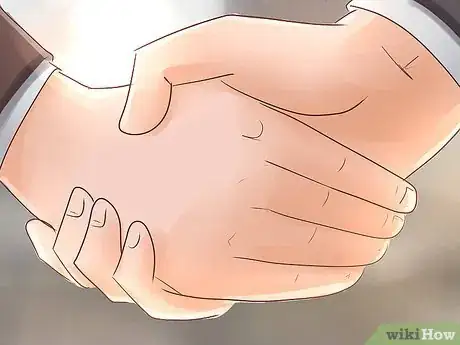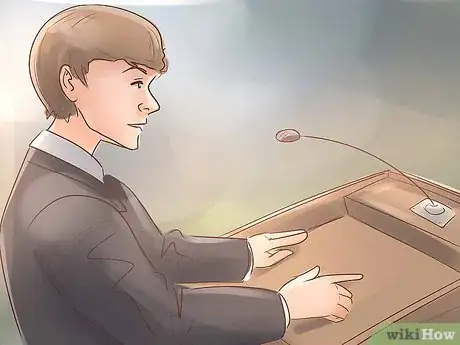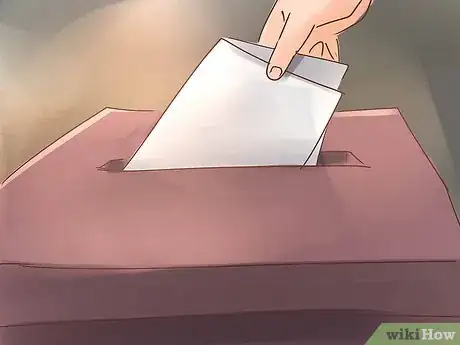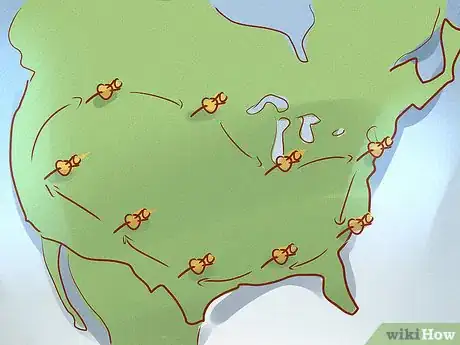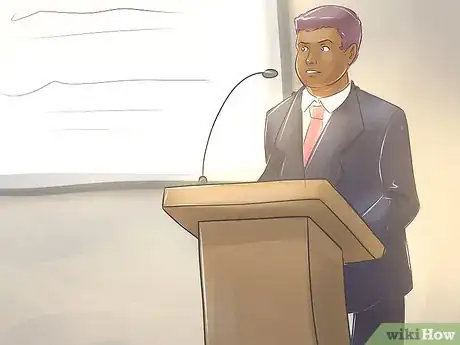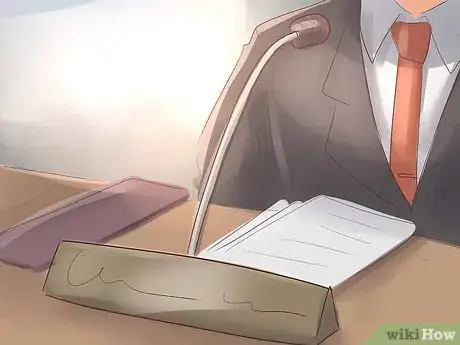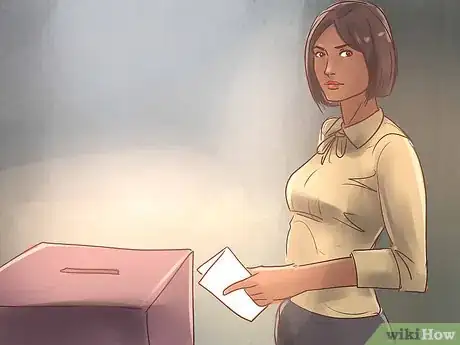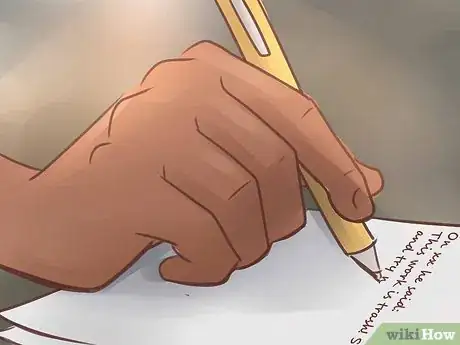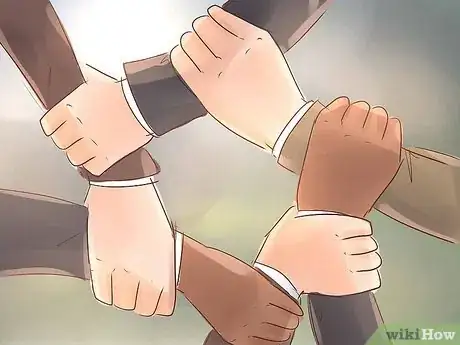This article was co-authored by Clinton M. Sandvick, JD, PhD. Clinton M. Sandvick worked as a civil litigator in California for over 7 years. He received his JD from the University of Wisconsin-Madison in 1998 and his PhD in American History from the University of Oregon in 2013.
wikiHow marks an article as reader-approved once it receives enough positive feedback. In this case, 93% of readers who voted found the article helpful, earning it our reader-approved status.
This article has been viewed 228,951 times.
A national delegate is someone who represents his or her state at that party’s national convention. The delegates get to cast a vote for the presidential candidate that they support and the vote will determine the party’s official candidate for President of the United States of America. The process is lengthy and it requires lots of hard work and determination, but there are several things you can do to become a national delegate.
Steps
Increasing Your Chances of a Nomination
-
1Be an active member of your political party. To be a delegate at your party’s national convention, it helps to be an active member of your political party. You can do this by staying up to date on the concerns and challenges of your party, volunteering for your party, and voting for party members in your local and state elections.
- Party workers are often selected as delegates, so you may even want to consider pursuing employment with your party.[1]
-
2Start supporting a candidate early. People who are sent to national conventions are often political activists and early supporters of a presidential candidate. Don’t wait until the last minute to start supporting someone. Choose a candidate who speaks to you and publicly support the candidate from the beginning of his or her campaign.
- You might consider doing grassroots campaigning for your chosen candidate, attending the candidate’s campaign trail events, or using social media to promote your candidate.
Advertisement -
3Run for a political position. Local political leaders may also be chosen to go to a party’s national convention. In fact, many of the people who are chosen to be delegates are elected officials.[2] If you are determined to be a national delegate, then you might need to get involved in local politics.
- For example, you might consider running for a position on your city council or even run for mayor. Watch for open positions that interest you and that match your skill set and qualifications.
-
4Vote in the primaries. Voting in the primaries is an important part of becoming a delegate. Not only does voting in your party’s primary election demonstrate your dedication to your party, it will also give you the right to vote at your party’s convention. Make sure that you vote in your party’s primary on March 1st.
- If you did not vote in the primaries, then you may still be able to vote at your party’s convention by signing an oath of affiliation with your party. Check your party’s rules to be sure.
Winning a Delegation Spot
-
1Determine if you live in a caucus or primary state. There are two systems used to elect delegates: the caucus system and the primary system. In the caucus system, political parties organize meetings in places like school gyms and community centers where people can gather to discuss and vote on the candidates. In a primary system, voters simply turn up at a polling place and cast their votes for a presidential candidate and delegates. While 13 states and territories still use the caucus system, most states now use a primary system to elect delegates. States and territories that still use a caucus system include:[3]
- Alaska
- Hawaii
- Iowa
- Kansas
- Kentucky (Republican only)
- Maine
- Nevada
- North Dakota
- Washington (Democratic only)
- Wyoming
- American Samoa
- Guam
- US Virgin Islands
-
2Attend your precinct’s caucus. If your state uses a caucus system, then delegates for your precinct will be selected by a public vote at your precinct’s caucus. At the caucus, people will gather to discuss the presidential candidates and make arguments for who should represent the party.
- If you hope to become a delegate for your party, then you will need to attend your precinct's caucus, convince those in attendance to vote for you, and win a delegate position.
- Precinct caucuses are usually held a few weeks after the primary election, which is towards the end of March. Find out for sure when the caucus will be held in your precinct and make sure that you are in attendance.
-
3Apply to be on the ballot in the primary election. If you live in a state that uses the primary system, then you will need to apply to get your name on the ballot as a delegate, promote yourself, and win the election to attend your county convention. Keep in mind that the rules for electing delegates vary from state to state, so it is important to check the requirements for your state well before the election.[4]
-
4Introduce yourself to people. Getting to know people and telling them about your efforts for the party will increase your chances of receiving votes. Introduce yourself to people at the caucus or at other events for your political party. You might even call some people who you know will be voting at the caucus or primary election. As you interact with people, make sure that you are being polite, pleasant, and professional.
- Try saying something like, “Hello. I’m ____ and I am running for a delegate position at the county convention. I have done extensive work for the party, including ________. Can I count on your vote?”
- Be willing to listen to other delegate candidates as well and offer your support to the other delegates you endorse. You will have the opportunity to vote for yourself and for others.
-
5Hand out fliers that detail your work. You may want to start promoting yourself ahead of time to people who will attend the caucus. You can do this by making some fliers that highlight your work and accomplishments. Then, mail out or hand out these fliers to people who will be voting.
- Make some fliers before the caucus or primary that detail the work you have done for your party and your candidate. On the flier, make sure that you include your name, why you should be chosen as a delegate, what you have done to promote the party’s interests, what you have done to support your candidate’s campaign, and a line to encourage people to vote for you.
- If you are not skilled with programs like Microsoft Publisher, then you may want to hire someone to create a professional looking flier for you.
-
6Give a great speech. If your state has a caucus system, then you will have the opportunity to give a one minute speech at the caucus meeting. Take time to craft this speech into something that will convince others that you should be chosen as a delegate. Keep in mind that writing a great speech takes time. Start planning your speech a few weeks before the caucus and practice it several times before the event. In your speech, make sure that you:
- Introduce yourself by name and give information about your job or party position. For example, if you are an elected official, then say so.
- Explain what you have done to promote the party’s interests.
- State what candidate you support and what you have done to support that candidate’s campaign.
- Request that people vote for you and thank them for listening.
-
7Vote for yourself. You are entitled to vote for yourself to be one of the delegates at your party’s convention. Make sure that you vote for yourself at the caucus or primary along with anyone else that you want to support.
Securing a Spot at the National Convention
-
1Register for and attend the county convention. If you are elected by your precinct to be a delegate at the county convention, then you will need to attend this convention to be eligible for a spot as a national delegate. This convention will take place on or around May 1st.
- You can register for this convention by visiting the state website for your party. For example, if you are a democrat living in Texas, then you would need to visit the Texas Democrats website to register for the convention.
- At the county convention, there will be another vote to select delegates to attend the state convention. Therefore, it is important to continue to promote yourself, just as you did for the caucus election. Talk to other delegates who will be at the convention, continue to be active with your party, and ask for votes.
- During the county convention, there will be another vote and you will have the opportunity to vote for yourself and others. If you are one of the winners, then you will get to attend your party’s state convention.
-
2Attend the state convention. The state convention brings together all of the state’s county delegates. If you win a spot as a delegate at the state convention, then you are even closer to being nominated as a national delegate. Just keep in mind that only about 10% of the state convention delegates will be sent to the national convention.
- To increase your chances of being elected as a national delegate, continue to promote yourself as much as possible leading up to and during the state convention. Continue to work hard for your party as well.
-
3Get a nomination from someone at the state convention. If you do not get a nomination to attend your state’s convention, then you can still be nominated by someone in attendance at that convention. The delegates at the state convention will break into caucuses where they will nominate and vote on additional delegates.[5]
- You might receive a nomination from someone if you are an active member of your party and you are well-known to other for your efforts to promote your political party.
- There is also the possibility of being nominated as an at-large delegate. These spots are open to members and non-members of a party’s committee, but they are competitive. Hundreds of people may apply for a few dozen spots. To be considered for an at-large delegate position, you will need to fill out an application.[6] Check with your party’s committee to get an application.
-
4Keep trying. If you don’t get a delegate spot the first time around, then keep trying! Becoming a delegate is a lengthy, competitive process. Most of the people who obtain delegate positions are elected officials or party insiders, so it can take many years to gain enough recognition to be chosen.[7] However, if you are determined to break into politics and attend the national convention as a delegate someday, then keep working to achieve your goal.
References
- ↑ http://www.pbs.org/newshour/rundown/so-you-want-to-be-a-delegate-to-the-republican-national-convention/
- ↑ http://www.pbs.org/newshour/rundown/so-you-want-to-be-a-delegate-to-the-republican-national-convention/
- ↑ https://www.businessinsider.com/primaries-caucuses-differences-between-which-states-2019-3
- ↑ http://www.pbs.org/newshour/rundown/so-you-want-to-be-a-delegate-to-the-republican-national-convention/
- ↑ https://www.texasgop.org/wp-content/uploads/2013/10/Texas-Delegate-Selection-Process-to-GOP-Convention.pdf
- ↑ https://www.texasgop.org/wp-content/uploads/2013/10/Texas-Delegate-Selection-Process-to-GOP-Convention.pdf
- ↑ http://www.pbs.org/newshour/rundown/so-you-want-to-be-a-delegate-to-the-republican-national-convention/
About This Article
A national delegate is someone who represents their state at that party’s national convention. To become one in the United States, you’ll need to be active in your political party and start supporting a candidate early on in their campaign. Alternatively, you might also run for elected office, since political leaders are sometimes chosen to go to their party’s national convention. Well before the primary election, you’ll need to spread the word that you’re running for a delegate position. You could hand out fliers, talk to people on the street, or organize a public speech to convince people to vote for you. Then, the delegates are decided in the primary election. To learn how to get a nomination from someone at the state convention, read more from our Legal co-author!

